Stella looks slightly reproving. ‘They’d only known each other for a few weeks.’
But it happens, Nelson wants to tell her. Didn’t he fall in love with Michelle as soon as he saw her, that day in the Blackpool Rock Shop?
‘Mrs Hastings,’ says Nelson. On Saturday night they had been on first name terms but that seems a long time ago. ‘How much do you know about the war years at Sea’s End House?’
‘Quite a lot,’ says Stella placidly. ‘More than Jack, I daresay. Irene talked to me a lot. Buster too. I was very interested.’
‘Did you know that Irene used to visit Archie Whitcliffe?’
‘Yes. She was fond of him. Buster had been almost like a father to him.’
It seems odd to think of the elderly man with the regimental tie having a father, surrogate or otherwise. Nelson remembers what Archie said about Buster Hastings. Hell of a chap. A real old devil. One of the old school. Not the most loving of descriptions.
‘What about Hugh Anselm? Did she visit him?’
‘She went once, a few years ago. She wasn’t so close to Hugh. I don’t think Buster liked him much, he always referred to him as that damned commie.’ She laughs softly.
‘Did you ever meet Hugh?’
‘Yes. I drove Irene over to see him that time.’
‘And Archie?’
‘Once or twice.’
It’s incredible, reflects Nelson. He had thought that Jack was the key to Sea’s End House but all the time it was the quiet woman sitting in front of him. She had known all Irene’s wartime stories, she remembers Buster, she had taken Irene to visit both Archie and Hugh.
‘Mrs Hastings, did Buster ever talk about Daniel West?’
‘Daniel West? No, I don’t think so. Who is he?’
‘He was a young boy in Buster Hastings’ platoon. He killed himself in 1940.’
‘Killed himself? How horrible.’
‘He killed himself to escape the memory of a war crime committed by Buster Hastings and his men.’
‘What do you mean, war crime?’
‘Has your husband told you about the film we were watching that day at your house? The day when it snowed?’
‘Only that it was some nonsense produced by Hugh.’
‘In the film Hugh Anselm accuses Captain Hastings and his sergeant of killing six defenceless German soldiers. The six bodies we found at Broughton Sea’s End.’
‘That’s not true!’
‘Your husband believed it.’
‘Jack? He can’t have.’
‘You said yourself that the war was a desperate time. People do desperate things in desperate times.’
She looks at him as if half conceding the point. In the background, a clock ticks.
‘Mrs Hastings,’ says Nelson. ‘Do you know how Hugh Anselm died?’
Stella’s brow furrows. ‘Some sort of accident, wasn’t it?’
‘He was found dead in his stairlift.’
‘How terrible.’
‘We think foul play may have been involved.’
He meant to shock her and he does. Her eyes widen and her hand clenches on the arm of her chair.
‘What do you mean?’
‘I mean that someone deliberately stopped the stairlift. Someone who knew that Hugh Anselm had a heart condition and that the agitation of trying to free himself would be likely to kill him.’
‘What are you suggesting?’
‘Archie Whitcliffe was suffocated,’ says Nelson brutally. ‘I think the same person killed both men.’
‘Archie? Suffocated? I don’t believe you.’
‘A post mortem examination cannot lie,’ says Nelson, though they can and do.
There is a silence. Out of the French windows, Nelson can see the sea, brightest blue under a paler blue sky. A white-sailed yacht moves slowly across the horizon.
‘Detective Chief Inspector,’ Stella is very pale but her voice is perfectly steady, ‘am I to understand that you suspect someone in this family of these horrible crimes?’
‘I suspect no-one and everyone,’ says Nelson portentously.
‘What does that mean?’
‘Someone killed those men and I think it was to protect the memory of Buster Hastings. Dieter Eckhart too. He was about to uncover the truth. I think someone killed to prevent that happening.’
She stares at him, her hands still clenched on the arms of her chair. An alarm goes off, making them both jump. Stella Hastings looks at her watch.
‘Time to check on Mother. Excuse me, Detective Chief Inspector. I won’t be long.’
And she goes out. Leaving Nelson to look out of the window, across the bay to the lighthouse. In front of him is a row of plants, one of which, he now realises, is planted in a German officer’s helmet.
Ruth is glad that she came. It is a beautiful afternoon, the sea sparkling in the sun. There is no snow left on the beach and it could almost be a summer day, if it were not for the sharp air that makes her catch her breath and wish she’d brought a scarf.
Craig is waiting for her at the foot of the slope. He is warmly dressed in a donkey jacket and black woolly hat.
‘Where’s Ted?’
‘He had to go back. Some domestic crisis. I said I would wait.’
‘That was kind of you.’
As Ruth follows Craig across the beach, she wonders about Ted’s domestic crisis. As far as she knows, he isn’t married or living with anyone. He’s a bit of an enigma, Irish Ted. He once told her that his name wasn’t even Ted.
Sandra had been happy to look after Kate for an hour longer. ‘No problem. Don’t worry so much, Ruth.’ But Ruth does worry. Tatjana’s words have left her feeling bruised and vulnerable. She has tried a couple of times to ring Tatjana back but her phone seems to be switched off. Is Ruth really such a terrible mother? She loves Kate more than her life but maybe this isn’t enough. Certainly the whole maternal thing doesn’t come easily to her, as it does to women like Michelle. Ruth never knows what to say to Sandra or to other mothers – one excruciating morning at a mother and baby group was enough to show her this. She doesn’t know what baby food to buy or which car seat to avoid. She’s never read a parenting magazine or watched Supernanny . She and Kate are having to make it up as they go along. And she’d thought she was doing all right, until the conversation with Tatjana.
But Tatjana has her own issues. Ruth knows this but she still shies away from talking properly to her friend. She has had her chances over the past weeks, but she has been too cowardly to take them. Tatjana will go home tomorrow and Ruth may never see her again.
They have left Broughton now and are crossing the beach where the barrels were found. The tide is out, rock pools stretch in front of them and Ruth can see the remains of the Victorian sea wall, like a green-slimed monster rising from the water, but something in the air perhaps, or in the wild calling of the seagulls, tells her that the tide may be about to turn. They’d better keep an eye on it. There’s no way off this beach and the cliffs are too high to climb.
‘How much further?’ she asks.
‘Just round the next headland.’
They have to climb over rocks, sharp with barnacles and crusted mussels, then in front of them lies another bay, a perfect semicircle scooped out of the sandstone cliff. And there, rearing out of the shallow water, is the unmistakeable hull of a ship. The water has eaten away at the wood and Ruth can see the blue sky through its prow but the shape is still there, a largish boat, about the size of the launch that took them to the lifeboat. It looks both menacing and strangely sad.
‘Have you any idea how old it is?’ asks Ruth, splashing forwards, despite the fact that she isn’t (for once) wearing her wellingtons. The water is freezing.
‘I don’t know but I think about sixty or seventy years old by the shape of it.’
Читать дальше
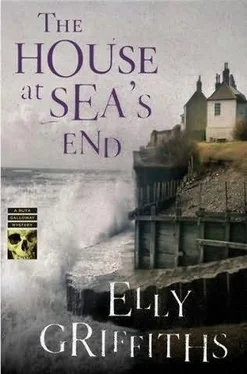

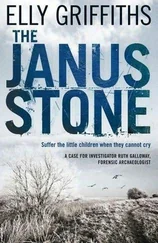
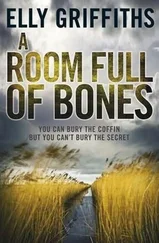

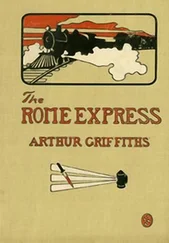


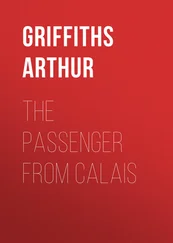



![Edward Ellis - Adrift on the Pacific - A Boys [sic] Story of the Sea and its Perils](/books/753342/edward-ellis-adrift-on-the-pacific-a-boys-sic-s-thumb.webp)